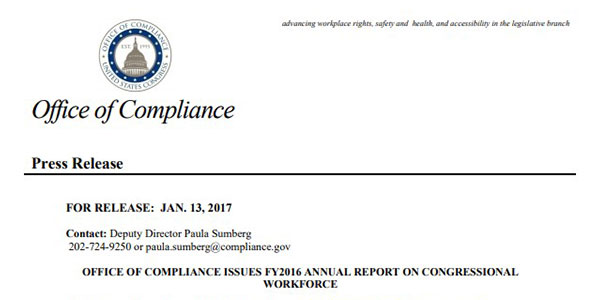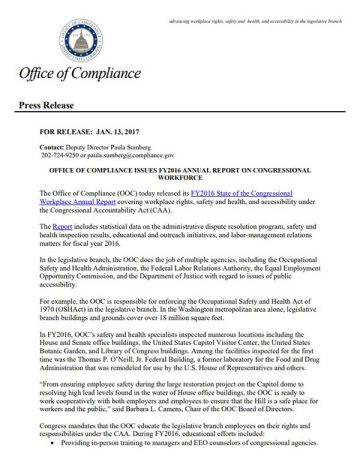OFFICE OF COMPLIANCE ISSUES FY2016 ANNUAL REPORT ON CONGRESSIONAL WORKFORCE
The Office of Compliance (OOC) today released its FY2016 State of the Congressional Workplace Annual Report covering workplace rights, safety and health, and accessibility under the Congressional Accountability Act (CAA).
The Report includes statistical data on the administrative dispute resolution program, safety and health inspection results, educational and outreach initiatives, and labor-management relations matters for fiscal year 2016.
In the legislative branch, the OOC does the job of multiple agencies, including the Occupational Safety and Health Administration, the Federal Labor Relations Authority, the Equal Employment Opportunity Commission, and the Department of Justice with regard to issues of public accessibility.
For example, the OOC is responsible for enforcing the Occupational Safety and Health Act of 1970 (OSHAct) in the legislative branch. In the Washington metropolitan area alone, legislative branch buildings and grounds cover over 18 million square feet.
In FY2016, OOC’s safety and health specialists inspected numerous locations including the House and Senate office buildings, the United States Capitol Visitor Center, the United States Botanic Garden, and Library of Congress buildings. Among the facilities inspected for the first time was the Thomas P. O’Neill, Jr. Federal Building, a former laboratory for the Food and Drug Administration that was remodeled for use by the U.S. House of Representatives and others.
“From ensuring employee safety during the large restoration project on the Capitol dome to resolving high lead levels found in the water of House office buildings, the OOC is ready to work cooperatively with both employers and employees to ensure that the Hill is a safe place for workers and the public,” said Barbara L. Camens, Chair of the OOC Board of Directors.
Congress mandates that the OOC educate the legislative branch employees on their rights and responsibilities under the CAA. During FY2016, educational efforts included:
- Providing in-person training to managers and EEO counselors of congressional agencies.
- Developing online and interactive training modules on issues of preventing sexual harassment and understanding the rights of employees with disabilities.
“The OOC has been happy to help any office wishing to educate and train its employees on discrimination and rights under the CAA,” retiring Executive Director Barbara J. Sapin said in the report. “Regular training on workplace rights increases staff retention and productivity.”

